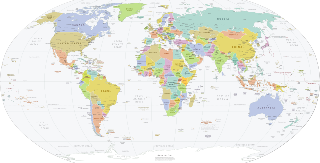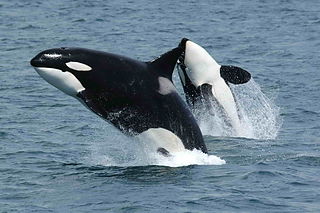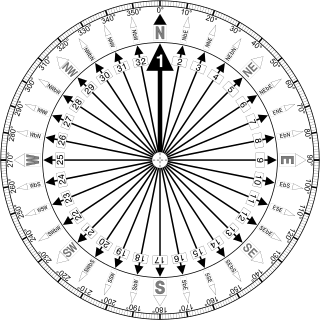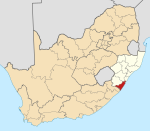
A country is a distinct territorial body or political entity. It is often referred to as the land of an individual's birth, residence or citizenship.
The Domain Name System (DNS) is a hierarchical and decentralized naming system for computers, services, or other resources connected to the Internet or a private network. It associates various information with domain names assigned to each of the participating entities. Most prominently, it translates more readily memorized domain names to the numerical IP addresses needed for locating and identifying computer services and devices with the underlying network protocols. By providing a worldwide, distributed directory service, the Domain Name System has been an essential component of the functionality of the Internet since 1985.
ISO 3166 is a standard published by the International Organization for Standardization (ISO) that defines codes for the names of countries, dependent territories, special areas of geographical interest, and their principal subdivisions. The official name of the standard is Codes for the representation of names of countries and their subdivisions.
Rabbinic Judaism considers seven names of God in Judaism so holy that, once written, they should not be erased: YHWH, El ("God"), Eloah ("God"), Elohim ("God"), Shaddai (“Almighty"), Ehyeh, and Tzevaot. Other names are considered mere epithets or titles reflecting different aspects of God, but Khumra sometimes dictates special care such as the writing of "G-d" instead of "God" in English or saying Ṭēt-Vav instead of Yōd-Hē for the number fifteen in Hebrew.

X, or x, is the twenty-fourth and third-to-last letter in the modern English alphabet and the ISO basic Latin alphabet. Its name in English is "ex", plural exes.
Genus is a taxonomic rank used in the biological classification of living and fossil organisms as well as viruses, in biology. In the hierarchy of biological classification, genus comes above species and below family. In binomial nomenclature, the genus name forms the first part of the binomial species name for each species within the genus.

In taxonomy, binomial nomenclature, also called binominal nomenclature or binary nomenclature, is a formal system of naming species of living things by giving each a name composed of two parts, both of which use Latin grammatical forms, although they can be based on words from other languages. Such a name is called a binomial name, a binomen, binominal name or a scientific name; more informally it is also called a Latin name.

A domain name is an identification string that defines a realm of administrative autonomy, authority or control within the Internet. Domain names are used in various networking contexts and for application-specific naming and addressing purposes. In general, a domain name identifies a network domain, or it represents an Internet Protocol (IP) resource, such as a personal computer used to access the Internet, a server computer hosting a website, or the web site itself or any other service communicated via the Internet. In 2017, 330.6 million domain names had been registered.
A pseudonym or alias is a fictitious name that a person or group assumes for a particular purpose, which differs from their original or true name (orthonym). This also differs from a new name that entirely or legally replaces an individual's own. The pseudonym identifies one or more persons who have true names but do not publicly disclose them. Most pseudonym holders use pseudonyms because they wish to remain anonymous, but anonymity is difficult to achieve and often fraught with legal issues.
A patronymic, or patronym, is a component of a personal name based on the given name of one's father, grandfather (avonymic), or an earlier male ancestor. A component of a name based on the name of one's mother or a female ancestor is a matronymic. A name based on the name of one's child is a teknonymic or paedonymic. Each is a means of conveying lineage.
A nickname is a substitute for the proper name of a familiar person, place or thing. Commonly used to express affection, a form of endearment and sometimes amusement. It can also be used to express defamation of character, particularly by school bullies. As a concept, it is distinct from both pseudonym and stage name, and also from a title, although there may be overlap in these concepts. A hypocoristic is a nickname of affection between those in love or with a close emotional bond. "Moniker" is a synonym.

In some cultures, a surname, family name, or last name is the portion of one's personal name that indicates their family, tribe or community.

A given name is the part of a personal name that identifies a person, potentially with a middle name as well, and differentiates that person from the other members of a group who have a common surname. The term given name refers to a name bestowed at or close to the time of birth, usually by the parents of the newborn. A Christian name is the first name which is given at baptism, in Christian custom.

The points of the compass are the vectors by which planet-based directions are conventionally defined. A compass rose is primarily composed of four cardinal directions—north, east, south, and west—each separated by 90 degrees, and secondarily divided by four ordinal (intercardinal) directions—northeast, southeast, southwest, and northwest—each located halfway between two cardinal directions. Some disciplines such as meteorology and navigation further divide the compass with additional vectors. Within European tradition, a fully defined compass has 32 'points'.

The modern English alphabet is a Latin alphabet consisting of 26 letters, each having an upper- and lower-case form. It originated around the 7th century from Latin script. Since then, letters have been added or removed to give the current Modern English alphabet of 26 letters with no diacritics, digraphs, and special characters. The word alphabet is a compound of the first two letters of the Greek alphabet, alpha and beta.

A digital object identifier (DOI) is a persistent identifier or handle used to identify objects uniquely, standardized by the International Organization for Standardization (ISO). An implementation of the Handle System, DOIs are in wide use mainly to identify academic, professional, and government information, such as journal articles, research reports, data sets, and official publications. However, they also have been used to identify other types of information resources, such as commercial videos.
Spanish naming customs are historical traditions that are practised in Spain for naming children. According to these customs, a person's name consists of a given name followed by two surnames. Historically, the first surname was the father's first surname, and the second the mother's first surname. In recent years, the order of the surnames in a family is decided when registering the first child, but the traditional order is still usually chosen.
A birth name is the name of the person given upon their birth. The term may be applied to the surname, the given name or to the entire name. Where births are required to be officially registered, the entire name entered onto a births register or birth certificate may by that fact alone become the person's legal name. The assumption in the Western world is often that the name from birth will persist to adulthood in the normal course of affairs—either throughout life or until marriage. Some possible changes concern middle names, diminutive forms, changes relating to parental status, and changes related to gender transition. Matters are very different in some cultures in which a birth name is for childhood only, rather than for life.

In biological classification, taxonomic rank is the relative level of a group of organisms in a taxonomic hierarchy. Examples of taxonomic ranks are species, genus, family, order, class, phylum, kingdom, domain, etc.
A Uniform Resource Locator (URL), colloquially termed a web address, is a reference to a web resource that specifies its location on a computer network and a mechanism for retrieving it. A URL is a specific type of Uniform Resource Identifier (URI), although many people use the two terms interchangeably. URLs occur most commonly to reference web pages (http), but are also used for file transfer (ftp), email (mailto), database access (JDBC), and many other applications.












